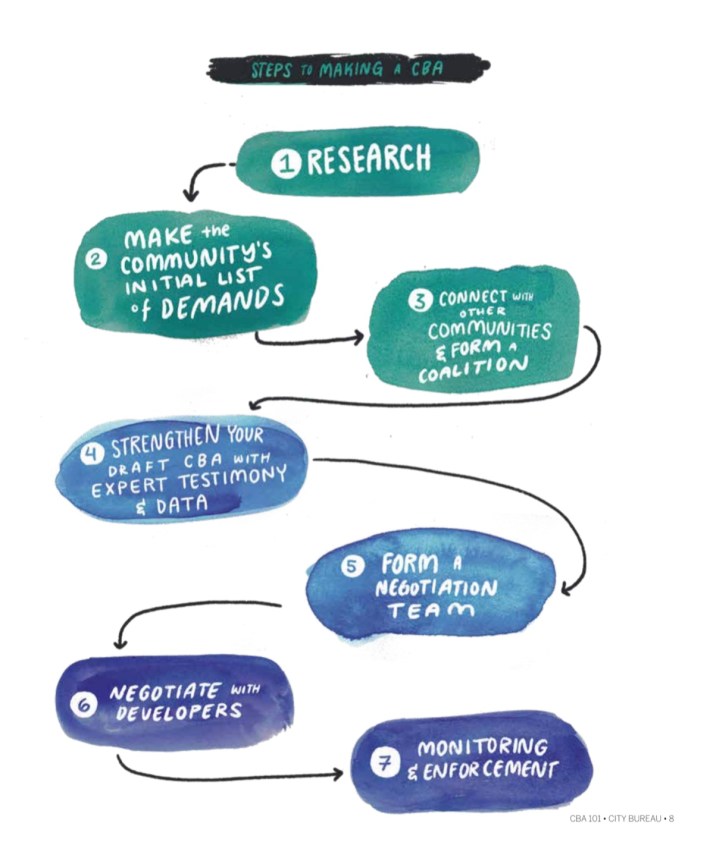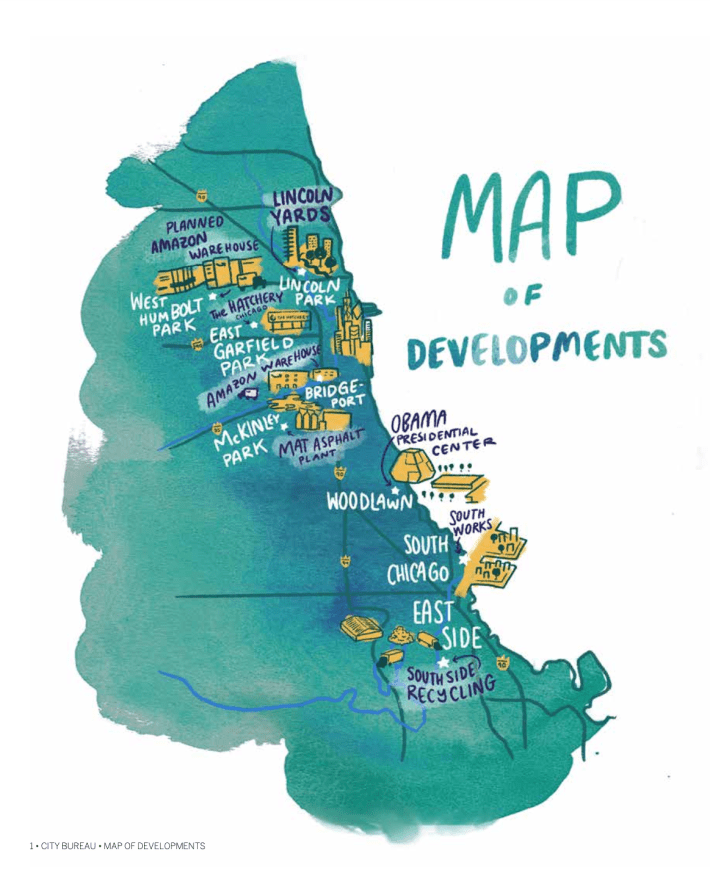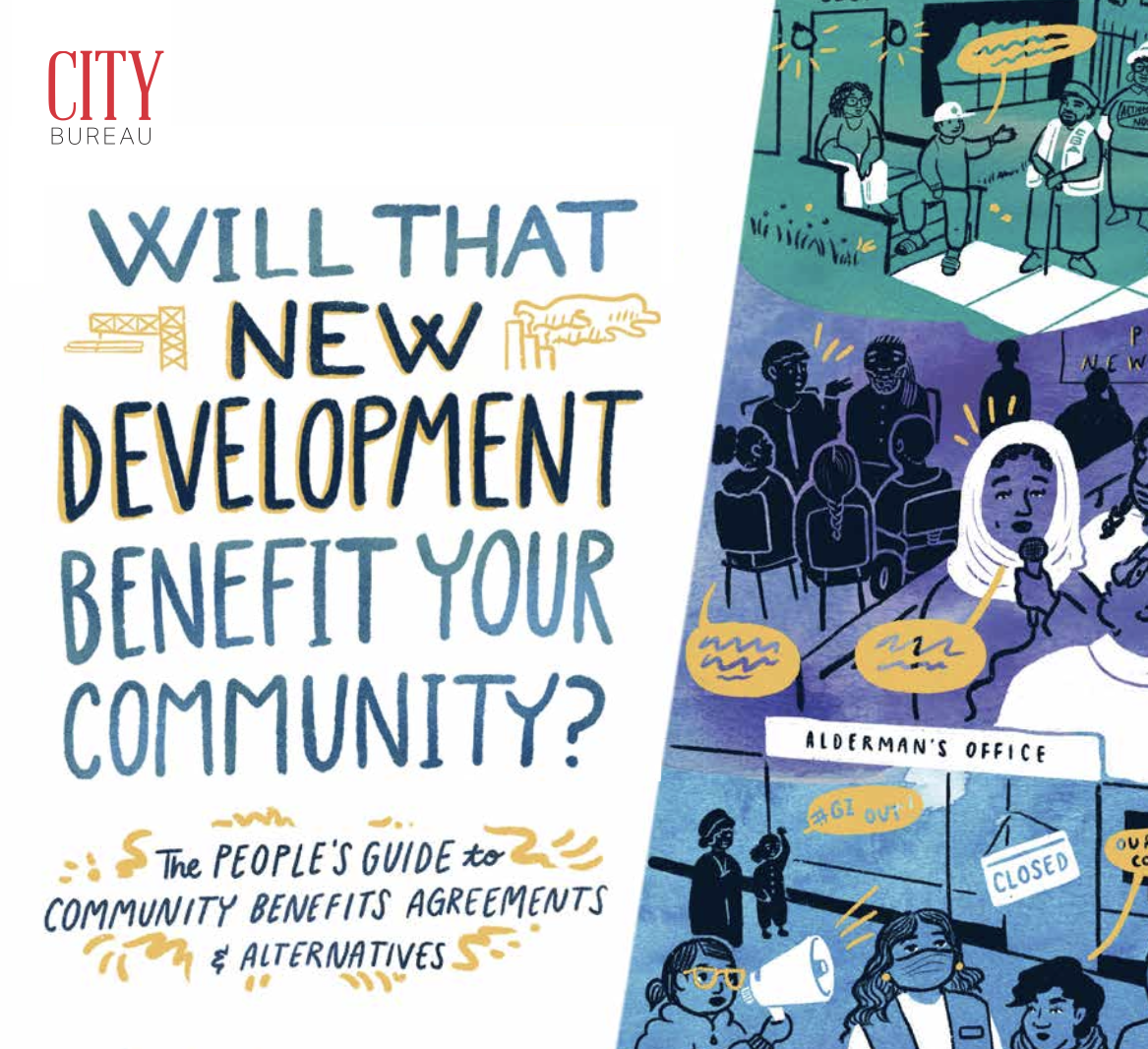When a new development is approved in Chicago, it's common for community residents to say they were caught off guard or uninformed that such a development was coming to their neighborhood. City Bureau, a Bronzeville-based a nonprofit civic media organization, recently published the 31-page zine “Will That New Development Benefit Your Community? The People’s Guide to Community Benefits Agreements and Alternatives.” City Bureau staff noticed for years that residents were frustrated by limited opportunities for them to provide input on proposed developments, and a lack of quality news and information around the development process. Chicagoans told the City Bureau that they wished more information and skill sharing opportunities were available regarding CBAs and other community development strategies.
For those unfamiliar with the term, a community benefits agreement is a legally binding contract between a developer and neighbors that includes commitments the developer makes to the community, in exchange for the residents' support. CBAs allow for neighbors to advocate for their own interests by directly negotiating. Common promises in a CBA include:
- Affordable housing requirements
- Living wage standards for employees
- Community services or funding for these programs
- Access to the space
- Workshops or job training programs
- One time payments to community groups or residents
- Hiring standards to ensure the workforce is local and made up of people of color and other disadvantaged workers, such as returning citizens
Along with outlining what a CBA is, City Bureau’s zine discusses the basics of drafting, securing and enforcing a CBA; key players in the city's approval process for project; alternatives to CBAs, and new policies and proposals that could lead to more equitable developments across Chicago.

CBAs allow residents to advocate for their own interests by directly negotiating with developers and creating a mechanism for enforcing those commitments. According to the Partnership for Working Families, a successful CBA contract should include a roadmap for how the developer will achieve the CBA's goals and detail the consequences if they are not met.
While I knew that each Chicago alderperson has their own ways of notifying residents about proposed developments, I was surprised to learn that alders are not required to inform residents about most developments. In some cases where neighbors in the immediate area must be notified, only residents within 250 feet of the development are notified, less than the length of a football field. Ultimately there is no set process in place for community engagement in Chicago's development process.
The zine recommends that readers stay up-to-date about new developments through their alder’s office, local news outlets, community groups and using the Chicago Cityscape website, a development news website created by Streetsblog Chicago cofounder Steven Vance. Chicago Cityscape tracks neighborhood, property and development data like demolition and building permits. Anyone can create one free email notification for a specific neighborhood, ward, or zip code on the website.

I appreciated that alternatives to CBAs were highlighted too. I learned about the neighborhood stock ownership plan, which allows the people most affected by a development to materially benefit from it and have some decision-making power as shareholders. Dr. Gary Goodman, executive director of a business improvement district in the Bronx, New York, discussed how this works. Goodman says the idea of a neighborhood stock ownership plan was born out of frustration with the lack of engagement with the Bronx community around the new Yankees stadium that was built in 2009. Although the Yankees had what they called a CBA, it was negotiated by elected officials, not community groups. Critics of the agreement noted the lack of community input on key decisions, such as the elimination of over 20 acres of parkland.
Goodman points out that the Yankees do not directly pay property taxes, which he says would’ve been far higher than the amount they promised to pay toward the community and the CBA. Residents are looking into using an NSOP to fund a proposed professional soccer stadium. If an NSOP were to be implemented, community members, organizations, and businesses could receive a code of profits from stadium naming rights and broadcast fees. It will be the first test of the NSOP model. “New York City neighborhoods need a new strategy to safeguard their integrity and create a partnership among residents, local businesses, nonprofits, government and developers,” Goodman wrote in an opinion piece for the Gotham Gazette, highlighted in the City Bureau zine.
Hopefully in time thousands of Chicagoans will be say that reading zine helped usher in a new model for how communities can wield stronger control over new developments and share in the benefits.
You can download a free PDF the zine on the City Bureau website, as well as request a print copy. Sign up for City Bureau's newsletter to stay up to date with local news.





